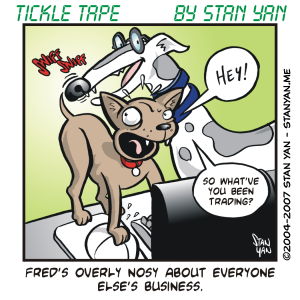The self-confident trader is decisive. He or she carefully plans a trade, patiently waits for the ideal market conditions, and executes the trade effortlessly and flawlessly. There is no self-reproach, no second-guessing, just a cool, calm execution. The trade may turn out to be a winner. It may be a loser. But at the moment of execution, the trader is sure, decisive, and confident. Cultivating the proper amount of confidence is much like walking a tightrope. That is, it is essential to not be too overconfident to the point of making impulsive, poorly devised trades, on the one hand, but not lack the confidence to the point of hesitating at critical moments of trading, on the other hand.
Overconfidence usually reflects fear. When traders are uncertain about their abilities, they hide these feelings by acting especially overconfident. One way the ego conquers fear is to deny it exists and to mask it by acting especially confident. But this is false confidence rather than true confidence. And when the pressure is on, one usually cracks under the strain unless he or she has a true sense of rock-solid confidence.
Although some people have a general sense of low self-confidence where they feel that they are generally incompetent (usually referred to as low self-esteem), most people have a generally positive view of themselves; they see themselves as able to master most situations. Trading, however, shakes this general sense of confidence because it is a new task that offers challenges and uncertainty that most people find unfamiliar and difficult to master. Understandably, they feel a sense of anxiety about their trading success. They may fear that they may blow out their account and have difficulty recovering.
Or they may worry that they could lose their confidence altogether. There’s only one way to combat these fears, however. A novice trader must gain as much experience with the markets as possible. In addition, one must use reliable trading strategies and learn how to identify the market conditions in which they are likely to produce a profit. With time and practice, and a lot of persistence, one eventually develops solid trading skills. With each successful trade comes added confidence until one learns that he or she can trade under a variety of market conditions, and recover from setbacks unscathed.
After gaining extensive experience with the markets, a trader develops a true and lasting sense of confidence that isn’t easily impacted by the daily vicissitudes of the markets. In the end, trading the markets successfully requires a sense of rock-solid confidence. Through experience and hard work, you can build the skills you need to trade profitably, consistently, and confidently.


